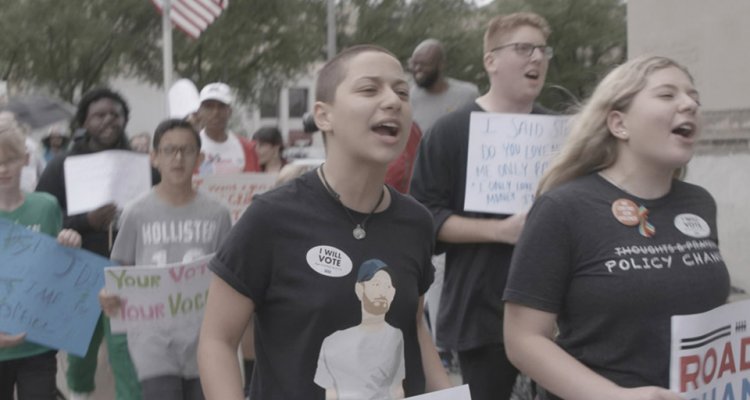Is it still shocking to wake up to news stories about mass shootings in the United States in the year 2020? Truthfully, there’s not a clear-cut answer to that question. If one answers yes, the response solidifies that gun-related violence is an unstoppable epidemic that forces those affected into a position of simulated helplessness, but if one answers no, this inverse reaction brings to light the desensitization ingrained in the country’s populace. You can’t win.
READ MORE: The 25 Most Anticipated Movies Of The 2020 Sundance Film Festival
As the world reeled in the wake of the Marjory Stoneman Douglas High School shooting in 2018, a handful of the survivors, all of which were under legal voting age, decided to take action. Augmenting apathy for action, #NeverAgain sparked a fire that swept across the globe, calling people across the world to speak out against existing policies that permit what some perceive as the perpetuation of gun violence in the United States.
Although the internet probably credits David Hogg and Emma González as the recognizable forerunners of the movement, Kim A. Snyder’s documentary, “Us Kids,” identifies the young leaders striving to re-shape a nation. Notably, Snyder previously tackled the heartbreaking aftermath of mass shootings in the Peabody award-winning documentary “Newtown.”
READ MORE: 52 Films Directed By Women To Watch In 2020
If you take the time to watch “Us Kids,” for the love of all things holy, drop your political biases at the door and leave them there. Do not—I repeat, do not—get swept away in the chronicling of individuals advocating for ideas that you might disagree with and forget that 17 people were robbed of their lives forever, leaving their families and friends with scars that will never heal. Open your ears to new perspectives. Engage in conversation without hostility. Enjoy the freedoms of engaging in a respectful debate over issues that should be resolved, or at the very least reduced dramatically.
With that disclaimer established, “Us Kids” is messy; not in the sense that the fundamental topic is likely to turn neighbors against each other, but rather that the actual film is scatterbrained in its organization. Regrettably, the documentary piles too many topics onto its plate, which leaves each avenue underdeveloped. “Us Kids” assembles a kaleidoscopic cache of subjects—some of which include the impact of social media on activism, the awe-inspiring power of the youth, PTSD, the unrecognized voices of minorities, and the increasing nihilism within Generation Z—but neglects to efficiently delegate its resources.
READ MORE: The 25 Best Movies Of 2020 We’ve Already Seen
That said, the documentary does not come across as insincere or overly manipulative. Obviously, the politics of “Us Kids” are irrefutably carved in stone, hence the disclaimer included above. However, Snyder includes enough encounters with pro-gun supporters to prove that the problem does not exist in dueling ideologies, but rather in the utter lack of empathy. As such, the level-headed conversations between the Parkland kids and their political opponents stand out as beacons of hope, indications that a resolution might be within reach.
Additional highlights stem from the moments that the documentary spends with Samantha Fuentes, who, while not marching alongside Hogg and Gonzàlez, takes a personal journey toward recovery through writing and music, showcasing the undefeatable soul of an artist and the heartbreaking ramifications of trauma. Fuentes’ segments substantially cement the notion that these kids are just that— kids.
Even after surviving the nightmare of a mass shooting, the students are still forced to combat the mundanities of life, such as dealing with a cheating boyfriend, losing friends, and choosing colleges, all the while battling grief on a day-to-day basis. These activists might be modern-day heroes, but they also cannot sidestep enjoying memes or binge-watching “Breaking Bad,” even though normalcy will likely never re-enter into their atmosphere. And that is heartbreaking to behold.
READ MORE: 100 Most Anticipated Films Of 2020
On the whole, “Us Kids” is frustrating. If the film were unimportant or held low aspirations, the cinematic sins that the documentary commits would be more forgivable. This is not the case. Therefore, letting the film’s pace meander due to shoddy editing or soundtracking news footage of mass shootings to Billie Eilish—a nauseating miscalculation that comes off so, so, so tasteless—can not be overlooked. Removing oneself completely from the documentary’s subject matter and examining “Us Kids” from the perspective of how the film presents its arguments and lays out its narrative, the cracks begin to show, and there are more than a few.
If “Us Kids” had shed its extra weight and fine-tuned its focus, the nonfiction feature might have bloomed into a decade-defining documentary. From a socio-economic viewpoint, 2020 holds the authority to reshape the United States in the eyes of many Americans, and even those in countries overseas. Snyder’s film realizes this in its hopes to function as a rallying cry for change, and while “Us Kids” might not be a measly whimper, it is far from a rousing war cry. [C]
Follow along for all of our coverage from the 2020 Sundance Film Festival here.

